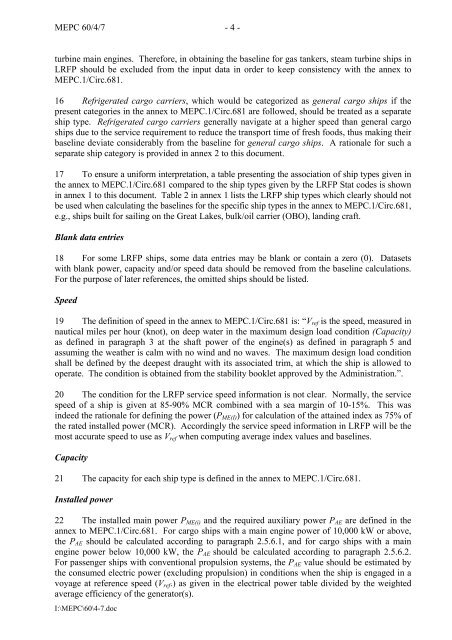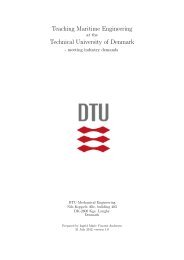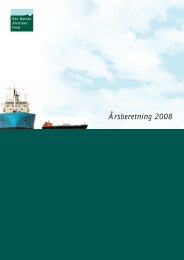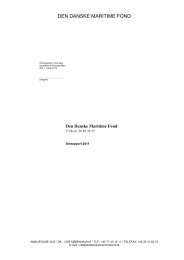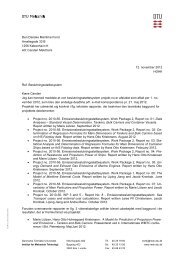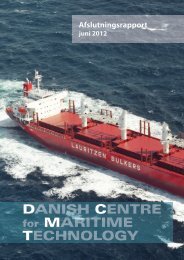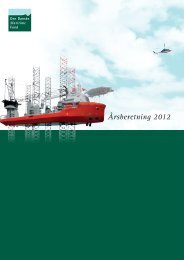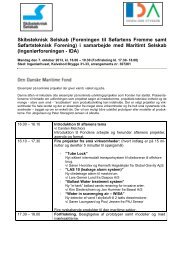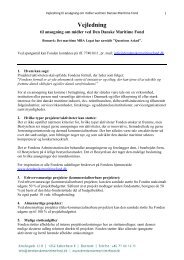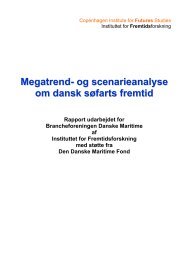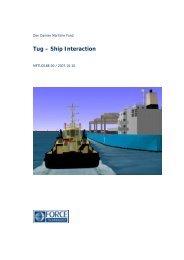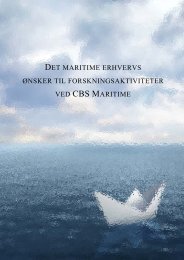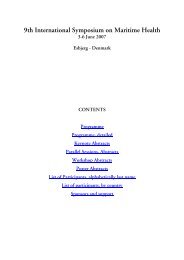IMO MARINE ENVIRONMENT PROTECTION COMMITTEE 60th ...
IMO MARINE ENVIRONMENT PROTECTION COMMITTEE 60th ...
IMO MARINE ENVIRONMENT PROTECTION COMMITTEE 60th ...
Create successful ePaper yourself
Turn your PDF publications into a flip-book with our unique Google optimized e-Paper software.
MEPC 60/4/7 - 4 -<br />
turbine main engines. Therefore, in obtaining the baseline for gas tankers, steam turbine ships in<br />
LRFP should be excluded from the input data in order to keep consistency with the annex to<br />
MEPC.1/Circ.681.<br />
16 Refrigerated cargo carriers, which would be categorized as general cargo ships if the<br />
present categories in the annex to MEPC.1/Circ.681 are followed, should be treated as a separate<br />
ship type. Refrigerated cargo carriers generally navigate at a higher speed than general cargo<br />
ships due to the service requirement to reduce the transport time of fresh foods, thus making their<br />
baseline deviate considerably from the baseline for general cargo ships. A rationale for such a<br />
separate ship category is provided in annex 2 to this document.<br />
17 To ensure a uniform interpretation, a table presenting the association of ship types given in<br />
the annex to MEPC.1/Circ.681 compared to the ship types given by the LRFP Stat codes is shown<br />
in annex 1 to this document. Table 2 in annex 1 lists the LRFP ship types which clearly should not<br />
be used when calculating the baselines for the specific ship types in the annex to MEPC.1/Circ.681,<br />
e.g., ships built for sailing on the Great Lakes, bulk/oil carrier (OBO), landing craft.<br />
Blank data entries<br />
18 For some LRFP ships, some data entries may be blank or contain a zero (0). Datasets<br />
with blank power, capacity and/or speed data should be removed from the baseline calculations.<br />
For the purpose of later references, the omitted ships should be listed.<br />
Speed<br />
19 The definition of speed in the annex to MEPC.1/Circ.681 is: “V ref is the speed, measured in<br />
nautical miles per hour (knot), on deep water in the maximum design load condition (Capacity)<br />
as defined in paragraph 3 at the shaft power of the engine(s) as defined in paragraph 5 and<br />
assuming the weather is calm with no wind and no waves. The maximum design load condition<br />
shall be defined by the deepest draught with its associated trim, at which the ship is allowed to<br />
operate. The condition is obtained from the stability booklet approved by the Administration.”.<br />
20 The condition for the LRFP service speed information is not clear. Normally, the service<br />
speed of a ship is given at 85-90% MCR combined with a sea margin of 10-15%. This was<br />
indeed the rationale for defining the power (P ME(I) ) for calculation of the attained index as 75% of<br />
the rated installed power (MCR). Accordingly the service speed information in LRFP will be the<br />
most accurate speed to use as V ref when computing average index values and baselines.<br />
Capacity<br />
21 The capacity for each ship type is defined in the annex to MEPC.1/Circ.681.<br />
Installed power<br />
22 The installed main power P ME(i) and the required auxiliary power P AE are defined in the<br />
annex to MEPC.1/Circ.681. For cargo ships with a main engine power of 10,000 kW or above,<br />
the P AE should be calculated according to paragraph 2.5.6.1, and for cargo ships with a main<br />
engine power below 10,000 kW, the P AE should be calculated according to paragraph 2.5.6.2.<br />
For passenger ships with conventional propulsion systems, the P AE value should be estimated by<br />
the consumed electric power (excluding propulsion) in conditions when the ship is engaged in a<br />
voyage at reference speed (V ref .) as given in the electrical power table divided by the weighted<br />
average efficiency of the generator(s).<br />
I:\MEPC\60\4-7.doc


